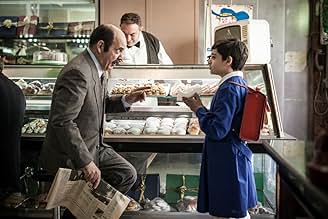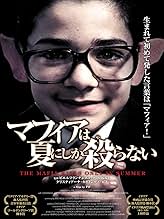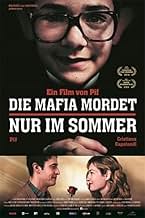CALIFICACIÓN DE IMDb
7.1/10
9.2 k
TU CALIFICACIÓN
Agrega una trama en tu idiomaPalermo in the 1970s. Ten-year-old Salvatore Giammarresi's life revolves around school and his first love, his sister's escapades and his parents' dreams. But the shadow of the Mafia and its... Leer todoPalermo in the 1970s. Ten-year-old Salvatore Giammarresi's life revolves around school and his first love, his sister's escapades and his parents' dreams. But the shadow of the Mafia and its crimes hangs over everything.Palermo in the 1970s. Ten-year-old Salvatore Giammarresi's life revolves around school and his first love, his sister's escapades and his parents' dreams. But the shadow of the Mafia and its crimes hangs over everything.
- Dirección
- Guionistas
- Elenco
- Premios
- 15 premios ganados y 20 nominaciones en total
Antonino Bruschetta
- Fra Giacinto
- (as Ninni Bruschetta)
- Dirección
- Guionistas
- Todo el elenco y el equipo
- Producción, taquilla y más en IMDbPro
Opiniones destacadas
Pierfranceso di Liberto (in arte Pif) has pulled off a remarkable achievement with this film. It centers on Arturo, a middle-class boy living in Palermo in the 1970s-1980s who gradually comes to awareness of the murderous evil of La Cosa Nostra. His dawning awareness, and his moral awakening, parallel that of his city, whose residents would have preferred to have ignored the cancerous presence of the Mafia, but the brazen murders of so many of the Mafia's opponents -- honest politicians, magistrates, journalists -- forced them to confront it. That, and the amazing victories of the magistrates Falcone and Borsellino in prosecuting these monsters; tragically, they were both murdered shortly after the obtained convictions of some 300 criminals. Diliberto's protagonist Arturo initially is fascinated both by the mobbed-up premier Giulio Andreotti, and believes Andreotti's -- and his parents' lies about the mafia not existing in Sicily. (Andreotti, the protector of mafiosi, liked to say that the problem of organized crime existed only in Campania and Calabria.) The film's tonal balance is remarkable; at times it is hilariously funny; at others, heartbreaking. As the mafia crimes escalate, one feels despair, but at the film's marvelous conclusion, hope is restored. La mafia uccide solo in estate is without doubt one of the best films ever made about the scourge of Cosa Nostra.
I beg to disagree with almost everyone on this one. There is nothing overtly 'artistic' about this movie. It treats real, tragic events with total superficiality and no feelings. The mafia bosses are pathetic caricatures, not bloodthirsty killers and cutthroat businessmen. It all looks like a 'see no evil, hear no evil do-good- er' cartoon...
I was there in those years, and I can assure everyone, there was nothing even remotely funny or entertaining in the affairs pictured in the movie. In this film everything is pictured as if it was all a joke, as if the dead weren't really dead, as if the mafia was a bunch of unruly kids, and nothing 'really' ever happened. Well, it all might be good in today's politically correct environment where all is forgotten and forgiven, but as I said at the beginning of this review, I beg to disagree...
I was there in those years, and I can assure everyone, there was nothing even remotely funny or entertaining in the affairs pictured in the movie. In this film everything is pictured as if it was all a joke, as if the dead weren't really dead, as if the mafia was a bunch of unruly kids, and nothing 'really' ever happened. Well, it all might be good in today's politically correct environment where all is forgotten and forgiven, but as I said at the beginning of this review, I beg to disagree...
This is a nationally-acclaimed director debut of Italian's new triple-threat Pif, who directs, co-writes and stars in this satirical comedy, chronicling the turbulent mafia assassinations in Palermo from 1970s to 90s, through the eye of Arturo (played by Bisconti as a young boy and Pif himself as the grownup), who life has been significantly influenced by the local mafia activities, usually accompanied by Pif's smug voice-over, he even self-claims his own birth is thanks to a mafia shootout downstairs of his parents' apartment, although the animated scenes are riddle with biological errors, nevertheless, the jaunty atmosphere is pleasing enough to lure audience into the storytelling.
A consistent thread running through all the various but cursory political assassinations is Arturo's unrequited affection towards his classmate Flora (played by Antona as a child and Capotondi as the adult), arguably the film's most delightful parts come from the childhood period, Pif manages to depict a rather humorous scenario out of the horrendous events happening wantonly, a highlight is Arturo's immense worship towards Il Divo, Giulio Andreotti, to reflect how political figures can wreak major influence on a white-sheet soul. After almost one-hour screen time (the film only runs in a terse 90 minutes), Arturo and Flora's finally run into each other's lives in their adulthood, the sudden jump creates a dissonance between Pit and Bisconti, especially the latter infuses Arturo with cherubic cuteness and tangible earnestness, also in physical terms, there are no clue or whatsoever to indicate that they are the same person with 20 years of age differences, and the budding romance has been snuffed out to pave the way for a self-indulgent rom-com which feels so trivial and contrived under the current of what was actually going on at then.
Reaping 2 awards (BEST NEW DIRECTOR and David OF THE YOUTH for Pif) out of its overall 9 nominations in David DI DONATELLO Awards and many new director trophies in domestic award circuits in 2014, the film certainly can connect more towards those who are well versed in the real events of the region and can finally laugh about the resonances afterwards, but for audience out of Italy, it falls flat in its executions when compared to a similar triple threat Guillaume Gallienne from its neighbour France, with his fetching debut and CÉSAR crowner Me, MYSELF AND MUM (2013), maybe in a certain extent, it also frankly reveals the present cinematic creativity and soils of these two great countries (both have enormously rich contributions towards world cinema), and now sadly, a visible gap seems to be widened through recent years, if this film can be a serious winner of BEST DEBUT in a calendar year, it is not a good sign for the mired Italian contemporary cinema scenes, scintillating new blood is urgently wanting.
A consistent thread running through all the various but cursory political assassinations is Arturo's unrequited affection towards his classmate Flora (played by Antona as a child and Capotondi as the adult), arguably the film's most delightful parts come from the childhood period, Pif manages to depict a rather humorous scenario out of the horrendous events happening wantonly, a highlight is Arturo's immense worship towards Il Divo, Giulio Andreotti, to reflect how political figures can wreak major influence on a white-sheet soul. After almost one-hour screen time (the film only runs in a terse 90 minutes), Arturo and Flora's finally run into each other's lives in their adulthood, the sudden jump creates a dissonance between Pit and Bisconti, especially the latter infuses Arturo with cherubic cuteness and tangible earnestness, also in physical terms, there are no clue or whatsoever to indicate that they are the same person with 20 years of age differences, and the budding romance has been snuffed out to pave the way for a self-indulgent rom-com which feels so trivial and contrived under the current of what was actually going on at then.
Reaping 2 awards (BEST NEW DIRECTOR and David OF THE YOUTH for Pif) out of its overall 9 nominations in David DI DONATELLO Awards and many new director trophies in domestic award circuits in 2014, the film certainly can connect more towards those who are well versed in the real events of the region and can finally laugh about the resonances afterwards, but for audience out of Italy, it falls flat in its executions when compared to a similar triple threat Guillaume Gallienne from its neighbour France, with his fetching debut and CÉSAR crowner Me, MYSELF AND MUM (2013), maybe in a certain extent, it also frankly reveals the present cinematic creativity and soils of these two great countries (both have enormously rich contributions towards world cinema), and now sadly, a visible gap seems to be widened through recent years, if this film can be a serious winner of BEST DEBUT in a calendar year, it is not a good sign for the mired Italian contemporary cinema scenes, scintillating new blood is urgently wanting.
Honestly, it started off fairly cute and fun. The young cast were great.
But it meandered to nowhere. Pointless. Try hard.
Interesting if you are a student of the Cosa Nostra, but otherwise give this mess a miss.
But it meandered to nowhere. Pointless. Try hard.
Interesting if you are a student of the Cosa Nostra, but otherwise give this mess a miss.
Directed by and starring TV personality Pierfrancesco Diliberto (Pif), the mix of comedy, childhood reminiscence and documentary reconstruction of Mafia killings in Palermo during the 1970s seems like an unusual mix, but The Mafia Kills Only In Summer would go on to win several film awards and be developed subsequently into a TV series.
There are two halves to the film, the first half dealing with the early childhood of Arturo (Alex Bisconti), his love for a new girl Flora, and his growing awareness as a child of the influence that the Mafia have over the everyday lives of the citizens of Palermo in Sicily. The second half, stars the director Pif as Arturo, now a grown man aspiring to be a journalist, still dreaming of his true love Flora as she reappears in his life, and with the events that would eventually lead to the decline of the Mafia's stranglehold over the city.
Both parts of the film have their own attractions. The first half has some moments of childhood whimsy and comic overplaying, a bit like the cinema fixation of Cinema Paradiso, only for Arturo the fascination is an unusually strange devotion to the Italian Prime Minister Giulio Andreotti. The second half mixes romantic comedy with Arturo and Flora's involvement in politics and journalism, which presents some unlikely contrasts alongside the increase in violence and assassination by mafiosi under pressure from the authorities.
In the end it's those connections to what is happening in the real-world that succeed and validate the films approach. It not only gives a real sense of what it means to have grown up in Sicily during those times, the strangeness of the times contributing to a strange view of the world for a young child, but it also manages to pay tribute to those who fought against the Mafia and paid for it with their lives. The style might seem incongruous and exaggerated, but it seems a genuine response to the times and the people who lived through them, and - just as importantly - it has an easy approach that ensures that its message is able to reach out to a wide mainstream audience.
There are two halves to the film, the first half dealing with the early childhood of Arturo (Alex Bisconti), his love for a new girl Flora, and his growing awareness as a child of the influence that the Mafia have over the everyday lives of the citizens of Palermo in Sicily. The second half, stars the director Pif as Arturo, now a grown man aspiring to be a journalist, still dreaming of his true love Flora as she reappears in his life, and with the events that would eventually lead to the decline of the Mafia's stranglehold over the city.
Both parts of the film have their own attractions. The first half has some moments of childhood whimsy and comic overplaying, a bit like the cinema fixation of Cinema Paradiso, only for Arturo the fascination is an unusually strange devotion to the Italian Prime Minister Giulio Andreotti. The second half mixes romantic comedy with Arturo and Flora's involvement in politics and journalism, which presents some unlikely contrasts alongside the increase in violence and assassination by mafiosi under pressure from the authorities.
In the end it's those connections to what is happening in the real-world that succeed and validate the films approach. It not only gives a real sense of what it means to have grown up in Sicily during those times, the strangeness of the times contributing to a strange view of the world for a young child, but it also manages to pay tribute to those who fought against the Mafia and paid for it with their lives. The style might seem incongruous and exaggerated, but it seems a genuine response to the times and the people who lived through them, and - just as importantly - it has an easy approach that ensures that its message is able to reach out to a wide mainstream audience.
¿Sabías que…?
- TriviaAll the major political, judicial and criminal figures depicted are real people. However, Jean Pierre and his television show, "Bonsuaro - Lo show dei palmeritani", are fictional.
- ErroresArturo and Flora meet in the graveyard. It is supposedly 28th of July, 1983, a day before judge Chinnici was murdered. A gravestone of a person died in 1988 is seen in the background.
- ConexionesSpin-off La mafia uccide solo d'estate (2016)
Selecciones populares
Inicia sesión para calificar y agrega a la lista de videos para obtener recomendaciones personalizadas
- How long is The Mafia Kills Only in Summer?Con tecnología de Alexa
Detalles
- Fecha de lanzamiento
- País de origen
- Sitio oficial
- Idioma
- También se conoce como
- The Mafia Kills Only in Summer
- Locaciones de filmación
- Productoras
- Ver más créditos de la compañía en IMDbPro
Taquilla
- Total en EE. UU. y Canadá
- USD 37,134
- Total a nivel mundial
- USD 6,782,571
- Tiempo de ejecución
- 1h 30min(90 min)
- Color
- Mezcla de sonido
- Relación de aspecto
- 1.85 : 1
Contribuir a esta página
Sugiere una edición o agrega el contenido que falta


























